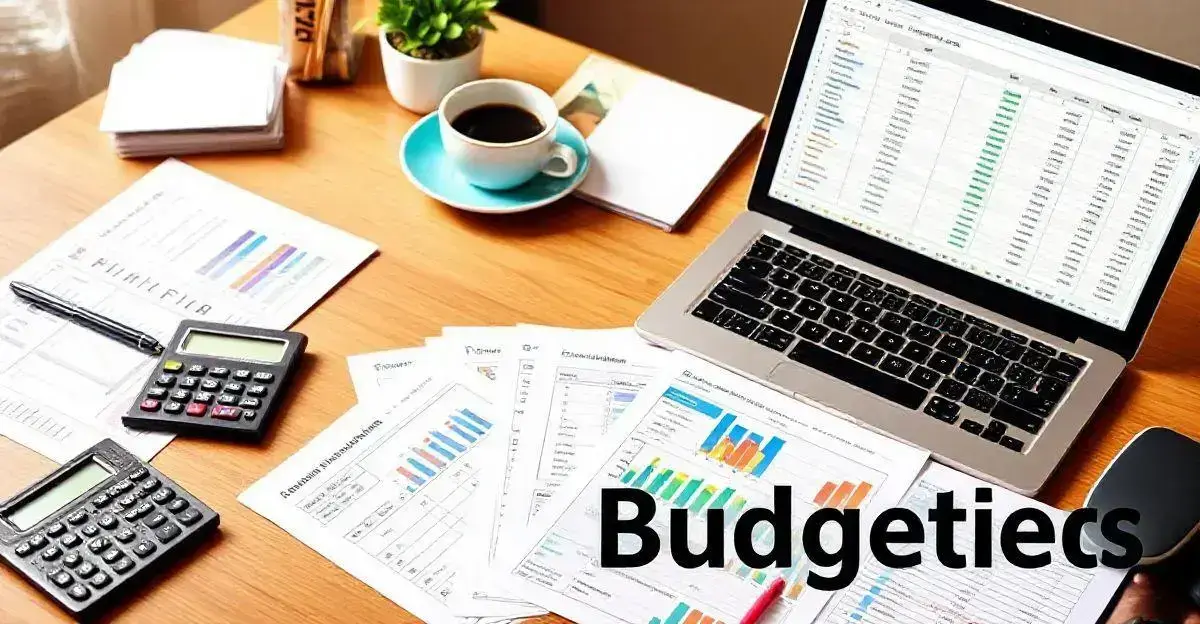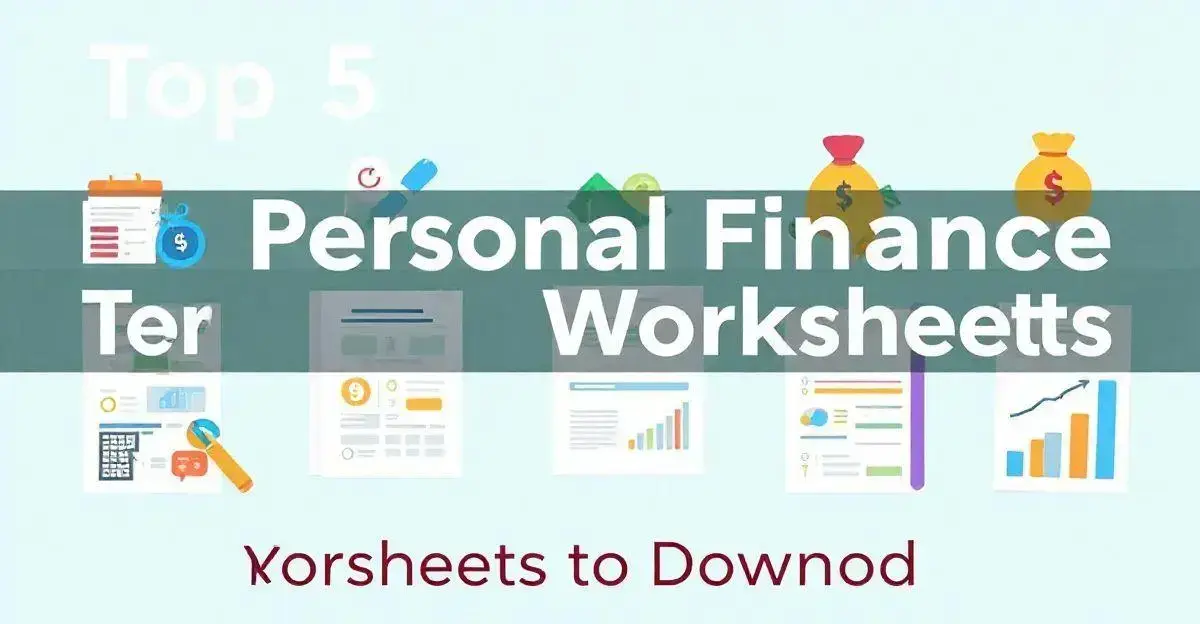Personal finance worksheets are essential for taking charge of your budgeting and financial planning. By utilizing these tools, you can easily map out your income, expenses, and savings goals, making financial management straightforward and empowering.
These worksheets help you categorize spending, revealing where your money goes and where you can save. With regular use, they promote accountability and can significantly improve your financial habits.
Curious about how to maximize the benefits of personal finance worksheets? Keep reading to discover the types you can use and tips for transforming your financial journey!
Understanding Personal Finance Worksheets
Understanding personal finance worksheets is the first step in managing your money effectively. These worksheets are simple tools designed to help track your income, expenses, and savings.
By utilizing them, individuals can gain a clear picture of their financial situation. Personal finance worksheets can include various categories such as housing, transportation, and entertainment, making it easier to see where your money is going.
Budgeting becomes more manageable with these worksheets because they provide a structured way to allocate your funds. Additionally, regularly reviewing and updating your worksheets encourages responsible financial habits and reduces the likelihood of overspending.
Benefits of Using Worksheets for Budgeting

Using worksheets for budgeting offers a variety of benefits that can simplify your financial management. For starters, personal finance worksheets provide a clear view of your income and expenses, making it easier to identify spending patterns.
By recording every expense, you can pinpoint areas where you might cut back. This level of detail helps you create a realistic budget that aligns with your financial goals.
Moreover, worksheets encourage accountability. When you see your financial information laid out, it motivates you to stick to your plan.
Regularly updating your worksheets can prevent overspending and keep your budget on track. All in all, using budgeting worksheets not only supports your financial discipline but also promotes long-term saving habits.
How to Create Your Own Personal Finance Worksheets
Creating your own personal finance worksheets is a fantastic way to tailor your budgeting process to meet your unique needs. Start by identifying what financial aspects you want to track. Common categories include income, mandatory expenses, and discretionary spending.
Once you have outlined your categories, you can use a spreadsheet program or simply a piece of paper to layout your worksheet. Begin with your income at the top, documenting all sources like salary, side gigs, or investments.
Below this, list out your expenses. Be specific and break them into fixed expenses, such as rent or utilities, and variable expenses like groceries. This will give you clarity on your spending habits.
Additionally, leave space for savings goals and debt tracking. By regularly updating and customizing your worksheets, you will gain control over your financial journey.
Top 5 Personal Finance Worksheets to Download

Finding the right personal finance worksheets can help you manage your budget more efficiently. Here are the top 5 personal finance worksheets to download and use.
First, the Monthly Budget Worksheet is crucial for tracking your earnings and expenses on a monthly basis. It allows you to see where your money goes each month.
Second, the Expense Tracker worksheet helps monitor daily spending, ensuring you stay on top of your budget.
Third, consider the Savings Goals Worksheet, which assists in setting and tracking your savings objectives, whether for emergencies or special purchases.
Fourth, the Debt Repayment Worksheet is vital for helping you manage and plan your debt payments and track progress over time.
Finally, the Annual Financial Overview Worksheet gives a comprehensive view of your financial health, summarizing income, expenses, and savings over the year.
By utilizing these worksheets, you can take charge of your personal finances and work towards your financial goals.
Tracking Expenses with Personal Finance Worksheets
Tracking expenses with personal finance worksheets is a smart way to manage your money. These worksheets can help you categorize your spending so you can see where your money goes each month.
Start by listing all your fixed expenses like rent and utilities. Next, add your variable expenses, which can include groceries, entertainment, and other costs that can fluctuate.
Regularly updating your worksheet will give you a clear view of your spending habits. Furthermore, understanding your expenses can help you identify areas to cut back.
By keeping a detailed log, you may find opportunities to save more each month. In this way, tracking your expenses becomes a valuable tool in achieving your financial goals.
Improving Savings Goals with Worksheets

Improving savings goals with worksheets is an effective strategy for achieving financial success. By using a savings worksheet, you can clearly outline your goals and track your progress.
Start by writing down your specific savings goals, such as saving for a vacation, a new car, or an emergency fund. Next, break these goals into smaller, manageable steps.
This allows you to see how much you need to save each month to reach your target. Regularly updating your savings worksheet not only keeps you accountable but also boosts your motivation as you see your savings grow.
Additionally, incorporate a section to record any unexpected windfalls, like bonuses or tax refunds, and allocate those funds towards your savings goals.
With consistent use of a savings worksheet, you’ll find that achieving your financial objectives becomes much more attainable.
Common Mistakes to Avoid with Personal Finance Worksheets
When using personal finance worksheets, it’s important to avoid common mistakes that can hinder your financial success. One frequent error is not updating your worksheets regularly.Failing to track your expenses can lead to overspending and missed savings goals.
Another mistake is being too vague with your categories. Instead of just labeling expenses as ‘miscellaneous,’ break them down into specific types like dining out, groceries, and entertainment. This allows for better analysis of your spending habits.
Additionally, don’t forget to include savings and investment goals in your worksheets. Neglecting these can prevent you from growing your wealth over time.
Always remember to review your worksheets periodically to see how well you are sticking to your budget and making progress toward your goals. By being mindful of these common pitfalls, you can enhance the effectiveness of your personal finance worksheets.
Next Steps for Financial Success

To achieve lasting financial success, it is vital to take concrete next steps. Start by reviewing your current financial situation. List all your sources of income and current expenses. Then, set specific and measurable financial goals. This could be paying off a debt, saving for a house, or building an emergency fund.
For those looking to expand their financial knowledge or explore new avenues, considering Investment Banking might be a viable option. It can provide insights and opportunities to diversify your portfolio and grow your wealth.
This could be paying off a debt, saving for a house, or building an emergency fund.Creating a budget helps in tracking your income and expenses, ensuring that you allocate money wisely.
Next, consider automating your savings. Set up automatic transfers to your savings accounts, making saving easier. Regularly review your progress towards your goals and adjust your plans as needed.
Seeking financial literacy resources, like books or online courses, can also enhance your understanding of personal finance. Remember that taking control of your finances is a journey, and each step can lead you closer to financial freedom.
Achieving Financial Security with Personal Finance Worksheets
Using personal finance worksheets is a powerful way to improve your financial health. By implementing these tools, you can effectively track your income and expenses, helping you make informed decisions about your budget.
It is important to regularly review and update your worksheets to reflect any changes in your financial situation. This will help you stay accountable and adjust your goals as needed.
Remember to avoid common mistakes, like vague category labels and not tracking your expenses frequently. Stay focused on your savings goals and take the next steps towards achieving financial success.
By being proactive and organized with your personal finance worksheets, you will be well on your way to achieving lasting financial security.